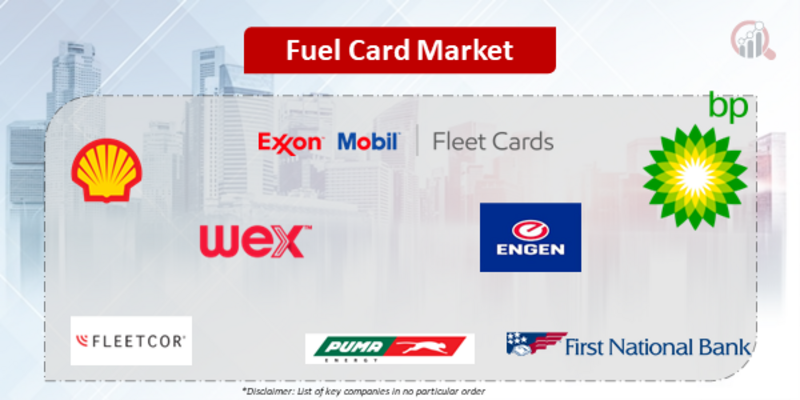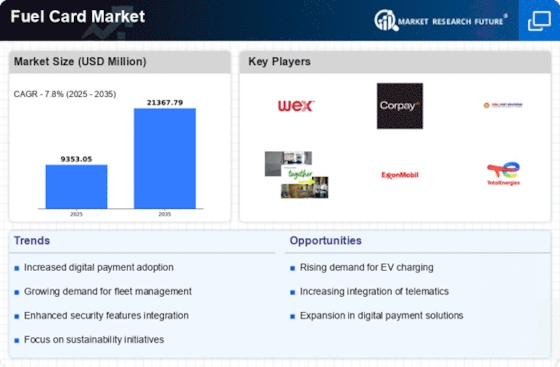Top Industry Leaders in the Fuel Card Market

The Competitive Landscape of the Fuel Card Market
Across bustling highways thrumming with trucks, sprawling delivery fleets navigating city streets, and remote off-road vehicles conquering rugged terrain, a silent conductor orchestrates the vital flow of fuel – the Fuel Card Market. This dynamic industry pulsates with the competitive energy of players vying for control over these digital keys to the pumps. Unveiling the strategies, crucial factors, and overall landscape of this intricate market is vital for navigating its currents and securing a commanding position.
Some of the Fuel Card companies listed below:
- Royal Dutch Shell
- Exxonmobil
- Bp
- Fleetcor Technologies Inc.
- Wex Inc.
- Oilibya
- Puma Energy
- Engen Limited
- First National Bank
- British Petroleum
- Fuelman
- Shell
- Spc
Strategies Adopted by Leaders:
- Network Breadth and Reach: FleetCor and WEX Inc. lead the charge with extensive retail fuel station networks spanning national and international markets, catering to diverse fleet sizes and operational needs.
- Data Insights and Analytics: Companies like BP and ExxonMobil offer robust reporting platforms providing detailed fuel spending data, mileage tracking, and fuel price optimization tools, enabling efficient fleet management and cost reduction.
- Loyalty Programs and Incentives: Leaders like Shell and Chevron implement tiered loyalty programs offering discounts, cashback, and rewards, attracting and retaining customers through competitive value propositions.
- Cybersecurity and Fraud Prevention: With increasing reliance on digital platforms, companies like EFS and Comdata prioritize robust cybersecurity measures and fraud detection systems, protecting sensitive data and financial transactions.
- Partnerships and Strategic Alliances: Collaborations with major retailers, trucking associations, and fleet management software providers expand network reach, offer bundled services, and cater to specific industry needs.
Critical Factors for Market Share Analysis:
- Network Coverage and Station Access: Companies offering extensive fuel station networks with convenient locations and diverse fuel types (gasoline, diesel, alternative fuels) command premium prices and secure market share by ensuring uninterrupted operation and fleet efficiency.
- Cost Management and Fuel Price Optimization: Providing tools for negotiating fuel discounts, monitoring real-time fuel prices, and identifying cost-effective stations empowers businesses to reduce fuel spend and maximize savings.
- Data Security and Compliance: Robust data encryption, secure transaction processing, and adherence to data privacy regulations like GDPR and CCPA are crucial for building trust and meeting legal requirements.
- Technology and Innovation: Companies offering integrated mobile apps, real-time transaction tracking, fleet management tools, and fuel card integration with accounting software differentiate themselves by improving user experience and operational efficiency.
- Customer Service and Support: Responsive customer service, dedicated account managers, and comprehensive support for troubleshooting and issue resolution are essential for customer satisfaction and long-term loyalty.
New and Emerging Companies:
- Fintech Startups like TripIt and GreenKey: These innovators focus on developing mobile payment solutions for fuel purchases, offering contactless payments, loyalty programs, and integration with expense management platforms, targeting convenience and ease of use for individual drivers and small businesses.
- Renewable Energy Companies: Tesla and ChargePoint are pioneers in electric vehicle charging infrastructure, offering charging networks for electric fleets and promoting sustainable fuel alternatives.
- Blockchain Technology Providers: Startups like Fuelchain and BitOasis explore secure blockchain-based platforms for fuel transaction tracking, loyalty program management, and fraud prevention, aiming to improve transparency and trust in the fuel card ecosystem.
Latest Company Updates:
Nov. 06, 2023- WEX, a leading business fuel card provider in Australia, unveiled a simple and efficient reporting system, Motorpass, that is set to transform the management of fuel expenses for businesses of all sizes. The new reporting system will streamline the process by providing a seamless and convenient way to track expenses. Apart from fuel purchases, WEX Motorpass can be used for vehicle-related services, roadside assistance, and exclusive discounts through partnerships with industry leaders.
Aug. 16, 2023- Maverik announced it would accept Comdata fleet card payments. The retailer has partnered with Comdata to accept its FLEETCOR fuel card to support professional drivers across its diesel fueling network in the United States. This is part of the brand's plans to expand via new store openings, its Kum & Go acquisition, and tapping into new business lines.
Apr.27, 2023- Uber Freight launched a new carrier fuel card to help carriers with on-the-road purchases. The card can purchase fuel at any fueling station or truck stop that accepts Visa. The card provides fuel discounts and same-day payments and has no annual fees. The company partnered with AtoB, a payment platform company, to launch the Uber Freight Carrier Card that can also help with cash flow management. The partnership is part of Uber Freight's effort to expand its carrier offerings.
JET enters fuel card business in Austria
Customers of UTA Edenred can now use their UTA Card to make purchases at the chain's locations across the country.
May 29, 2023- JET Tankstellen Austria announced a partnership with UTA Edenred to include the brand's service stations across the mobility service provider's network. The partnership will enable customers to use their UTA Card at any JET location to purchase diesel/gasoline, car accessories, lubricants, and vehicle washes. With the cooperation with UTA Edenred, JET is now entering the fuel card business and will tap into a new customers and generate additional volume and sales at its existing locations.










